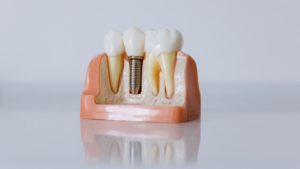Dental implants are one of the most effective and long-lasting solutions for replacing missing teeth. Unlike dentures or bridges, implants are designed to be a permanent part of your oral health. But just how long do dental implants last? The answer depends on several factors, including the materials used, oral hygiene, lifestyle habits, and professional maintenance. Here we’ll explore the lifespan of dental implants, the factors affecting their durability, and how you can ensure they last a lifetime.
Understanding the Lifespan of Dental Implants
A well-placed dental implant with proper care can last 25 years or more, and in many cases, they remains functional for a lifetime. Studies show that dental implants have a success rate of over 95%, making them one of the most reliable dental restoration options.
A dental implant consists of three main parts:
- The Implant Post – A titanium or zirconia screw that fuses with the jawbone.
- The Abutment – A connector piece that attaches the crown to the implant.
- The Crown – The visible, tooth-like structure made of porcelain or ceramic.
While the implant post can last a lifetime, the crown typically needs to be replaced every 10 to 15 years due to natural wear and tear. However, with good oral hygiene and regular check-ups, some crowns last even longer.

Factors That Affect the Longevity of Dental Implants
1. Oral Hygiene
Good oral hygiene plays a crucial role in the longevity of your implants. Brushing twice a day, flossing, and using an antibacterial mouthwash help prevent infections like peri-implantitis (inflammation around the implant). Poor hygiene can lead to implant failure, so maintaining a strict oral care routine is essential.
2. Quality of the Implant Material
Most dental implants are made of titanium, known for its strength, durability, and biocompatibility. Some patients opt for zirconia implants, which offer a metal-free alternative with excellent aesthetics. High-quality materials tend to last longer and reduce the risk of implant failure.
3. Bone Health and Jawbone Density
Dental implants need a strong jawbone for support. If you suffer from bone loss due to conditions like osteoporosis, the implant may not fuse properly, shortening its lifespan. In such cases, a bone graft might be necessary to provide a stable foundation for the implant.
4. Smoking and Lifestyle Choices
Smoking and excessive alcohol consumption can negatively impact the healing process and long-term stability of dental implants. Smokers are at a higher risk of implant failure, as tobacco reduces blood flow to the gums, slowing down the healing process.
5. Diet and Chewing Habits
Chewing on hard foods like ice, nuts, and hard candies can put excessive pressure on the crown, leading to fractures or damage. Additionally, habits like teeth grinding (bruxism) can cause wear and tear, reducing the implant’s lifespan. Wearing a night guard can help protect the implant from excessive force.
6. Regular Dental Check-ups
Routine dental visits (every six months) allow your dentist to monitor the implant’s condition, check for gum infections, and perform professional cleanings. Early detection of any issues can help prevent complications and prolong the implant’s life.
How to Make Your Dental Implants Last a Lifetime
To maximize the lifespan of your dental implants, follow these essential tips:
- Maintain excellent oral hygiene by brushing, flossing, and using mouthwash daily.
- Visit your dentist regularly for check-ups and professional cleanings.
- Avoid smoking and excessive alcohol consumption to promote faster healing and long-term success.
- Be mindful of your diet, avoiding hard foods that can damage the crown.
- Wear a night guard if you have a habit of grinding your teeth.
- Address gum disease or bone loss before getting an implant to ensure long-term stability.
What Happens If a Dental Implant Fails?
Although rare, implant failure can occur due to infection, bone loss, or mechanical damage. Early signs of implant failure include:
- Persistent pain or discomfort
- Swelling or inflammation around the implant
- Loosening of the implant or crown
- Difficulty chewing
If you experience any of these symptoms, consult your dentist immediately. In most cases, implant failure can be treated by replacing the implant or performing a bone graft if necessary.
Conclusion
So, how long do dental implants last? With proper care, they can last a lifetime. The implant post itself is designed to be permanent, while the crown may need replacement after 10-15 years. The key to longevity is good oral hygiene, regular dental check-ups, and a healthy lifestyle.
Investing in dental implants is a long-term commitment, but their durability, functionality, and natural appearance make them an excellent choice for tooth replacement. By following the right care practices, you can enjoy a healthy, confident smile for decades to come.
If you’re considering dental implants, consult with a trusted dentist to ensure you receive high-quality materials and expert placement. With the right approach, your dental implants can be a lifelong solution to missing teeth.

